Towards legal protection for domestic labour
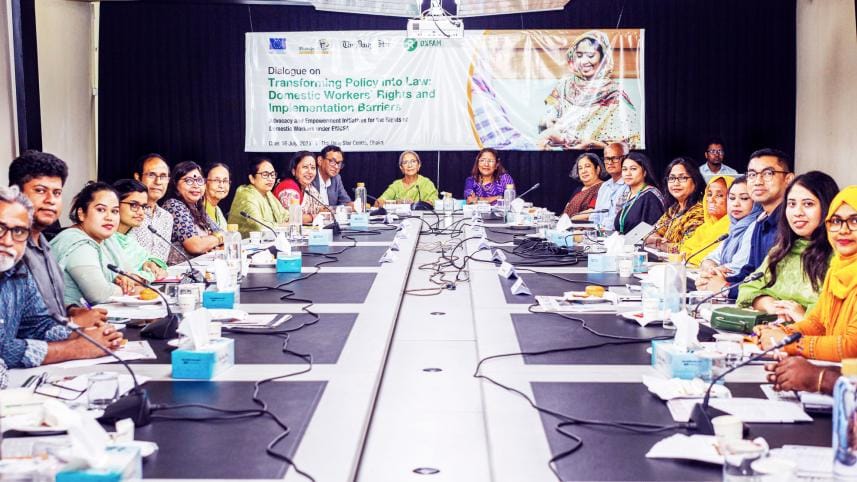
The dialogue "Transforming Policy into Law: Domestic Workers' Rights and Implementation Barriers" was held on July 16, 2025, under the EWCSA project, jointly organised by Shobujer Ovijan Foundation, Oxfam in Bangladesh, The Daily Star, and co- funded by The European Union. Here is a summary of the discussion.

Mahmuda Begum
Executive Director, Shobujer Ovijan Foundation
Under the EWCSA project, by Oxfam and co-funded by the EU; there have been numerous discussions over the years concerning the rights and recognition of domestic workers in Bangladesh. The primary objective of today's roundtable is to advance the process of formally recognizing domestic workers as labor and ensuring their inclusion within relevant legal frameworks.
A crucial step in this direction is the ratification of the International Labor Organization (ILO) Convention No. 189, adopted in 2011, which calls for the protection and decent working conditions for domestic workers worldwide. Bangladesh has yet to ratify this important convention.
On behalf of domestic workers, the Domestic Workers Rights Network (DWRN) has formally submitted a request to the government, urging the enactment of the Domestic Workers' Protection and Welfare Policy, 2015 into law. Our aim is to raise awareness of this policy among both employers and workers, particularly across urban and peri-urban areas, so that all stakeholders understand its significance and support its legal implementation.
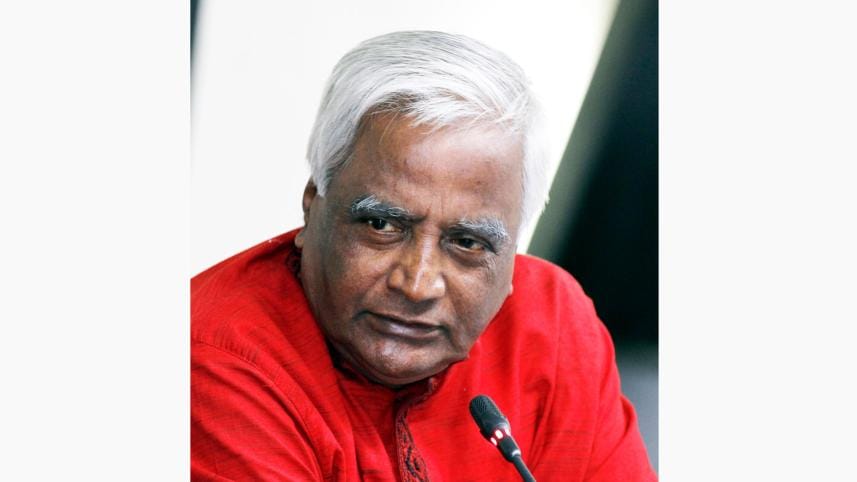
Abul Hossain
Acting Coordinator, Domestic Workers' Rights Network (DWRN)
In 2008, a code of conduct was developed to safeguard the rights of domestic workers, marking a significant milestone. This was later formalised with the publication of the Domestic Workers' Protection and Welfare Policy in the government gazette on 21 December 2015.
Despite these advancements, Bangladesh has yet to ratify the ILO Convention No. 189. Given the current political context and the presence of a non-partisan interim government, it is an opportune moment to move forward with the ratification process. The lack of political will has historically hindered progress in this area.
It has been suggested that the policy can only proceed to the Cabinet for approval once it has been endorsed by the Tripartite Consultative Council (TCC). We urge all relevant authorities to expedite this process and take concrete steps towards enacting this long-awaited legislation.

Parveen
Domestic Worker from Kallyanpur, Beneficiary of Shobujer Ovijan Foundation
Before receiving awareness sessions and Training under EWCSA, we were unaware of many things—especially our fundamental and legal rights. We often did not receive our daily or monthly wages on time. I want to emphasize the importance of continued training and awareness programs to help us understand how to protect ourselves.
Please continue supporting us so we can learn more about our rights and how to claim them. For example, in disputes between domestic workers and employers, law enforcement often sides with the employer, making it difficult for us to get justice.
My demand is to treat domestic workers as human beings. Show us dignity, respect, and humanity—just as every individual deserves.
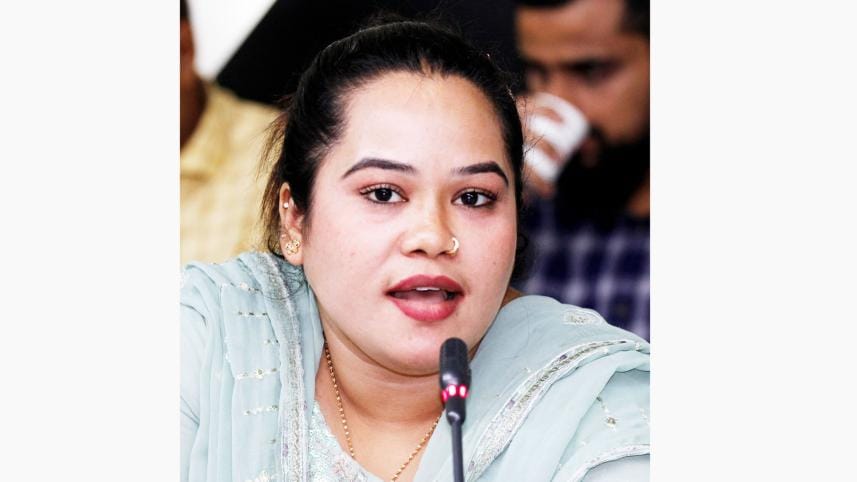
Shathi
Employer at South Abason, Kallaynpur, and Employee of Shobujer Ovijan Foundation
I strongly believe that a formal contract between a household employer and a domestic worker is essential. Such agreements can help clarify roles, responsibilities, and rights for both parties. The implementation of this practice should begin without delay to ensure better protection and accountability.
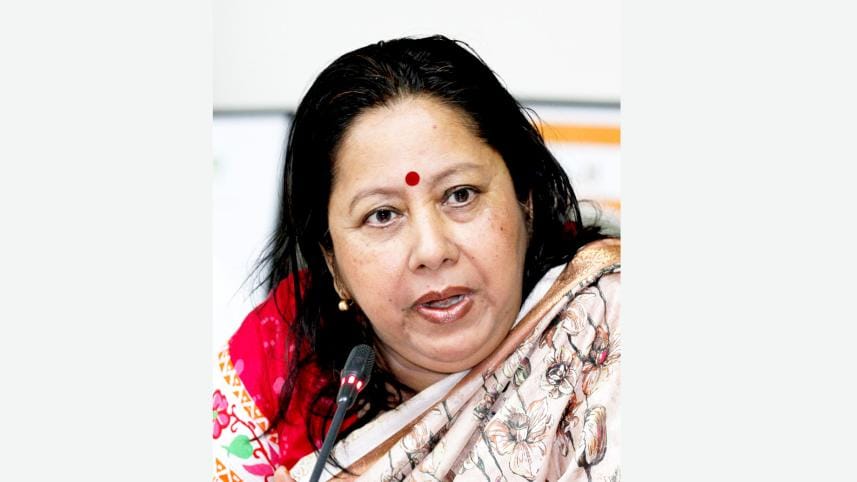
Sumaiya Islam
Executive Director, Bangladesh Nari Sramik Kendra (BNSK)
The remittances sent by domestic workers employed abroad must be acknowledged as a vital part of our economy. Despite working overseas, they remain integral contributors to our national development, and their contributions should be properly recognised.
It is also important to note the fundamental difference between a factory worker and a domestic worker—the nature of their work, employment conditions, and employers vary significantly. This distinction must be reflected when reviewing or formulating labour policies.
Above all, the Domestic Workers Protection and Welfare Policy, 2015, must be enacted into law—not only for the benefit of domestic workers but for the advancement of civil society and the country as a whole.
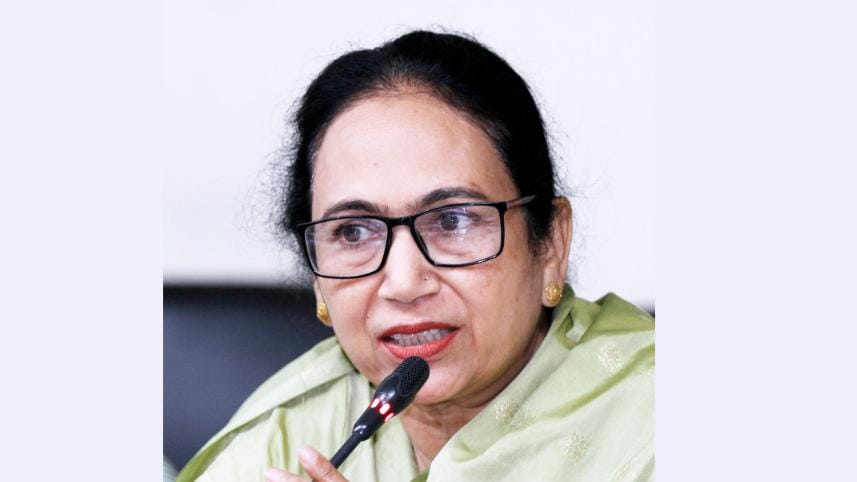
Murshida Akter
General Secretary, National Domestic Women Workers Union
Unfortunately, domestic workers are still not treated fairly. Incidents of injustice against them rarely receive media attention. Since the Domestic Workers Protection and Welfare Policy was published in 2015, police stations have begun to register complaints involving abuse or mistreatment of domestic workers. However, without a binding legal framework, these cases often fail to progress beyond the initial stage of investigation. The absence of specific legislation significantly hampers the delivery of justice.
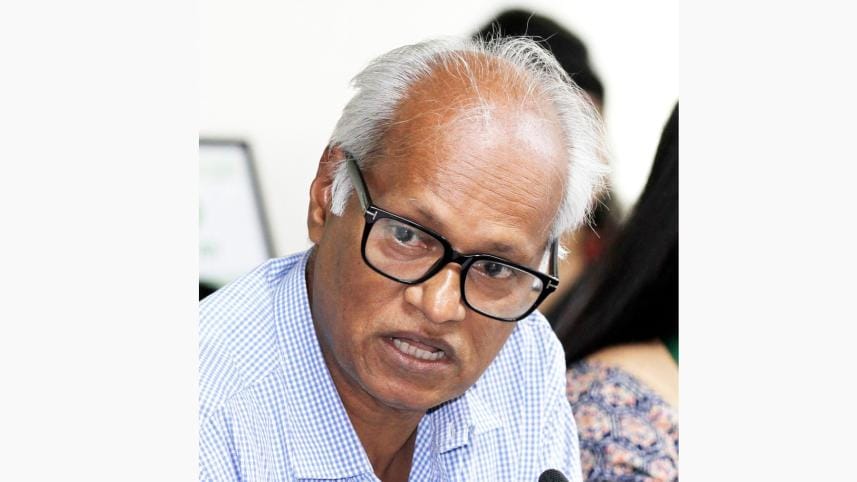
Razequzzaman Ratan
Former Member, Labour Reform Commission
It is crucial to distinguish between "domestic work" and "domestic labour." While we all contribute to household tasks, domestic labour refers to individuals employed in others' homes in exchange for wages—making them workers with specific rights and responsibilities. These include clear identification of the employer, defined duties, fair remuneration, and outlined liabilities, often summarised as the three Rs: Recognition, Registration, and Remuneration.
Despite the introduction of the Domestic Workers' Protection and Welfare Policy in 2015, it has yet to become law. The Labour Reform Commission, launched by the interim government in November 2024, proposed including domestic workers in the Labour Law—though these reforms are pending gazette notification.
A written contract is essential for both accountability and protection. Community-based committees at ward or neighbourhood levels could offer vital support in emergencies. As household dynamics evolve, so does the scope of domestic work—requiring skill development and upskilling support.
Current labour laws still exclude domestic and sanitation workers and allow child labour under 14. The Commission has recommended addressing these gaps. Drawing from global examples like Germany and Argentina, Bangladesh must leverage digital tools and social mobilisation to uplift the dignity and well-being of domestic workers—who are integral to our households.
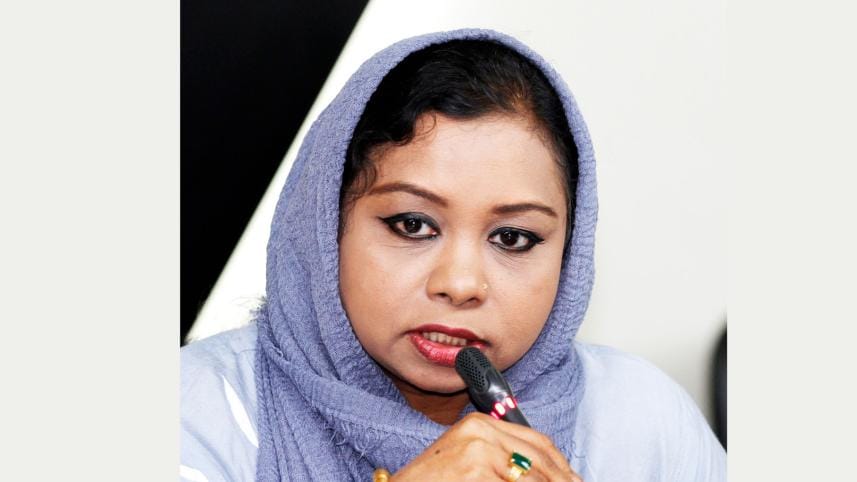
Mahmuda
Psychologist
Domestic workers constantly live with fear of job loss, which leads to chronic stress, anxiety, and in severe cases, post-traumatic stress disorder. This insecurity affects not only their mental well-being but also their children's development. Many domestic workers lack family support to care for their children, resulting in emotional neglect and long-term psychological impacts on the next generation. When falsely accused at work, they often have no one to turn to. Whether or not a law exists, we must provide job security—through contracts or alternative measures. Above all, the mental health challenges faced by domestic workers must be formally recognised and addressed in policy frameworks. A mentally healthy workforce is essential for both the workers and the families they serve.

A H M Shafiquzzaman
Secretary, Ministry of Labour and Employment
Let us begin with a question: how many of us have a formal written contract with our domestic workers? Advocacy and protests have their place, but I believe structured dialogue is more sustainable and impactful. Just as trade unions engage in collective bargaining to resolve disputes, we must adopt similar mechanisms for domestic work.
Although the Domestic Workers Protection and Welfare Policy 2015 exists, it lacks legal enforceability. There is no legal mandate requiring written contracts or agency involvement, and recruitment mostly occurs informally. To address disputes, we have introduced Alternative Dispute Resolution (ADR)—a non-judicial method that offers a middle path.
I urge stakeholders to come together under a unified platform to push for legal recognition and reform. The call for converting the 2015 policy into law is notably absent. Many NGOs and organisations are working individually; collective efforts would be more effective.
Regarding international obligations, Bangladesh has yet to ratify ILO Convention 189, which ensures rights and protections for domestic workers. Ratification requires consensus among the government, labour representatives, and employers. A proposal summarising ILO Conventions 155, 187, and 190 has already been submitted to the Cabinet for review. If Convention 189 is ratified, its provisions—such as protection from abuse and harassment—will become legally binding.
Bangladesh has already ratified the ILO Conventions on the Minimum Age (No. 138) and the Worst Forms of Child Labour (No. 182), listing 43 hazardous tasks prohibited for children.
Finally, we have a "Workers' Welfare Fund" which domestic workers can benefit from—covering children's education, maternal support, and compensation in case of a worker's death. However, progress must start at home, with written contracts and registration to build a national database of domestic workers.
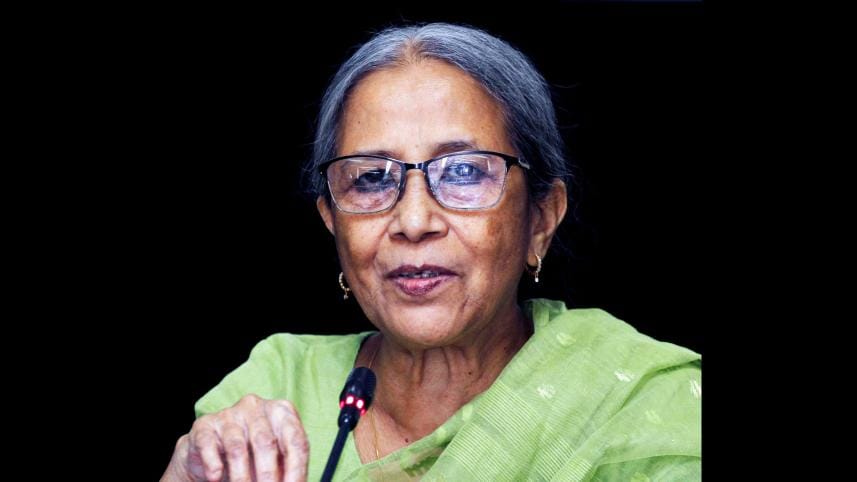
Farida Akter
Advisor, Ministry of Fisheries and Livestock
The formation of the Labour Reform Commission is a notable step forward. Shobujer Ovijan represents a progressive movement in women's empowerment, where both employer and employee are women, a relationship built not only on labour but also solidarity. Without the contributions of domestic workers, many of us would struggle to manage our homes. This interdependence must be recognised with dignity and respect.
Respect also needs to be built into the physical spaces we inhabit. Most modern homes lack designated resting areas for domestic workers, despite increasingly relying on them. As homes become more technology-driven with washing machines, dishwashers, and vacuum cleaners, we must provide appropriate training so domestic workers can build relevant skills and reduce their physical burden.
From a health perspective, research shows that many domestic workers use betel leaf, jorda, or tobacco to suppress hunger, harming their well-being. As citizens and employers, we have a responsibility to ensure their access to proper nutrition and healthcare. It is a matter of fundamental rights.
Lastly, we must include domestic workers in policy and social dialogue. Without their voices, we risk crafting solutions that don't reflect their realities. Listening to them directly is essential to addressing their problems meaningfully and building inclusive and respectful systems for their empowerment and protection.
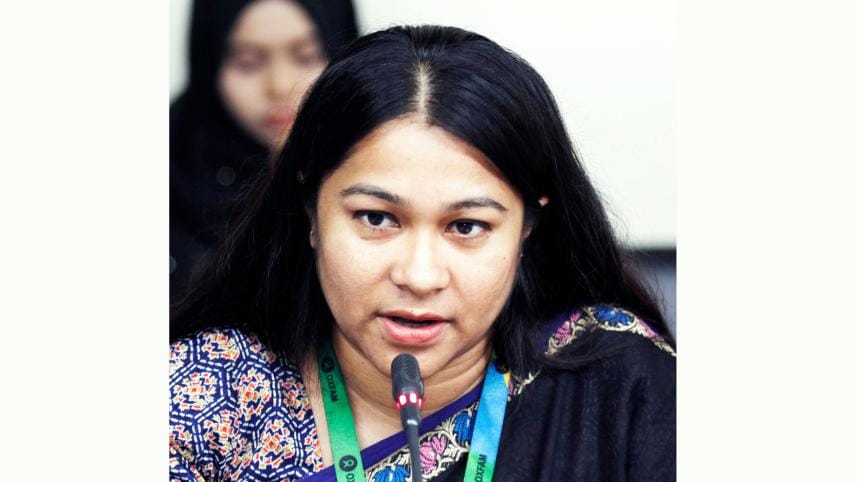
Khadeja Akter Antora
Program Officer – Gender Justice & Social Inclusion, Oxfam in Bangladesh
Oxfam, in collaboration with partner organizations, is working to advance the rights of women engaged in the informal sector, particularly domestic workers. Domestic workers contribute significantly to the national economy yet remain largely invisible and unrecognized within policy and legal frameworks.
The absence of legal recognition leaves domestic workers vulnerable to exploitation and abuse, both domestically and abroad. Including them in the national labour law is crucial—not only to ensure their safety, security, and fundamental rights, but also to hold employers accountable. Such legal inclusion would represent a significant step toward justice and dignity for this often-overlooked segment of the workforce.
Under the EWCSA project, Oxfam and its partners, co-funded by the EU, have already worked on the formation of community-based leadership and solidarity networks among domestic workers in Dhaka and outside of Dhaka, have taken a series of initiatives on advocacy, both national and area-based, and continued the leadership development initiatives among domestic workers. So, these workers' networks function similarly to grassroots trade unions, creating safe spaces where workers can share experiences, support one another, and advocate collectively for their rights.
Legal reform, combined with community empowerment, is essential to building a more just and inclusive society where every woman worker is recognized, protected, and treated with dignity.

Tapon Kumar Das
Deputy Director, Campaign for Popular Education (CAMPE)
Although CAMPE primarily focuses on education, the organization began working on domestic workers' rights in 2017. Several measures were recommended to be implemented both before and after the passage of the law. These include establishing agencies dedicated to supporting domestic workers by assisting with job placements and ensuring their safety, security, and fundamental rights. A police-managed database to register and monitor domestic workers is also necessary. Additionally, using respectful language when addressing domestic workers is important. Other key recommendations include building hostels and daycare facilities, providing timely wages, health benefits, bonuses, and holidays. Conducting research on occupational health hazards affecting domestic workers is also essential to improve their working conditions and wellbeing.
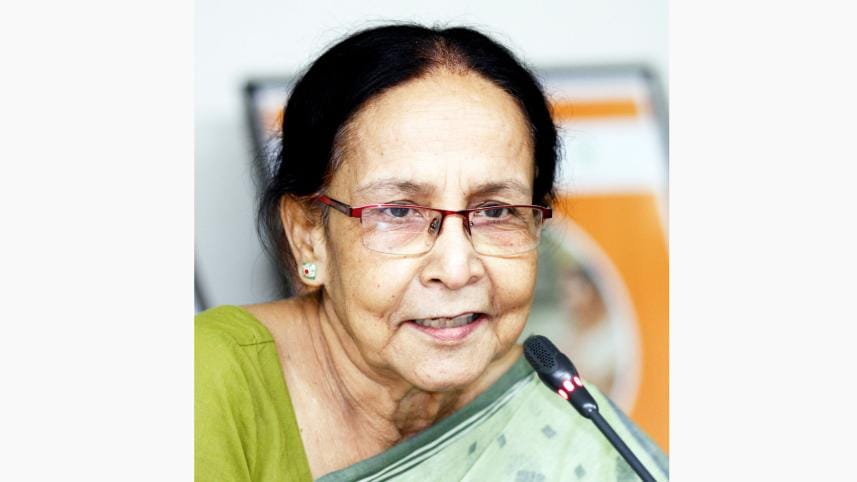
Roksana Sultana
Executive Director, Breaking the Silence (BTS)
Creating awareness is the most important step. How many of us here today truly understand our responsibilities towards domestic workers? Living in government quarters, I once had to explain to the building owners' association why I give my helper one day off each week and why I advocate for their rights. Some time ago, I initiated a pilot project in the Mirpur area to facilitate online wage payments for domestic workers. The project was successful, with telecommunication companies kindly waiving extra fees for these transactions. This initiative remains sustainable and shows the potential of practical solutions to improve domestic workers' welfare.

Maheen Sultan
Senior Fellow of Practice- Gender and Social Transformation, BRAC Institute of Governance and Development (BIGD), BRAC University also a Former Member of Women Reform Commission
Even after the law is enacted, the work will not end there. Every task a woman performs, whether paid or unpaid, inside or outside the home, deserves recognition. The lack of respect for domestic women workers and their employers is deeply rooted in social norms and customs. Therefore, even with legal reforms, a shift in public mentality is essential.
BIGD and Shobujer Ovijan jointly researched sexual harassment faced by domestic workers, especially young women. The study revealed alarming issues such as domestic workers being fed unsafe or spoiled food, denied access to homeowners' restrooms, and deprived of vacations and holidays.
To address these challenges, fostering solidarity between employers and employees is crucial. The research also highlighted the existence of an informal but strong support network among domestic workers, which should be institutionalized.
Local governments must establish effective grievance mechanisms and support all residents, regardless of their voting status, as a moral responsibility. It is not too late to pursue social change and transform mindsets, ensuring domestic workers receive their rightful recognition and protection.

Tanjim Ferdous
In-Charge, NGOs and Foreign Missions, The Daily Star, and Moderator of the Session
The dialogue underscored the urgent need to enact the 2015 Domestic Workers' Policy into law to ensure legal protection for millions of workers. Through the EWCSA project, Shobujer Ovijan Foundation, Oxfam, EU and partners are championing awareness, leadership, and access to justice. True progress now demands collective action- government, civil society, and stakeholders must unite to guarantee recognition, dignity, and rights for domestic workers across Bangladesh.
Recommendations
- Include and recognize domestic workers under Bangladesh Labor Law.
- Enact the 2015 policy as law and ratify ILO Convention 189
- Make written contracts mandatory for all domestic workers
- Create a national, police-managed domestic worker database
- Form community-level support and advocacy committees
- Ensure fair wages, leave, health benefits, and safety nets
- Provide training on leadership and skill development.
- Focus on relation build up and connection between employee and employer.



 For all latest news, follow The Daily Star's Google News channel.
For all latest news, follow The Daily Star's Google News channel.
Comments